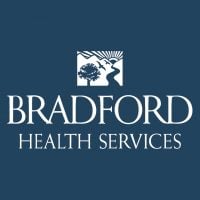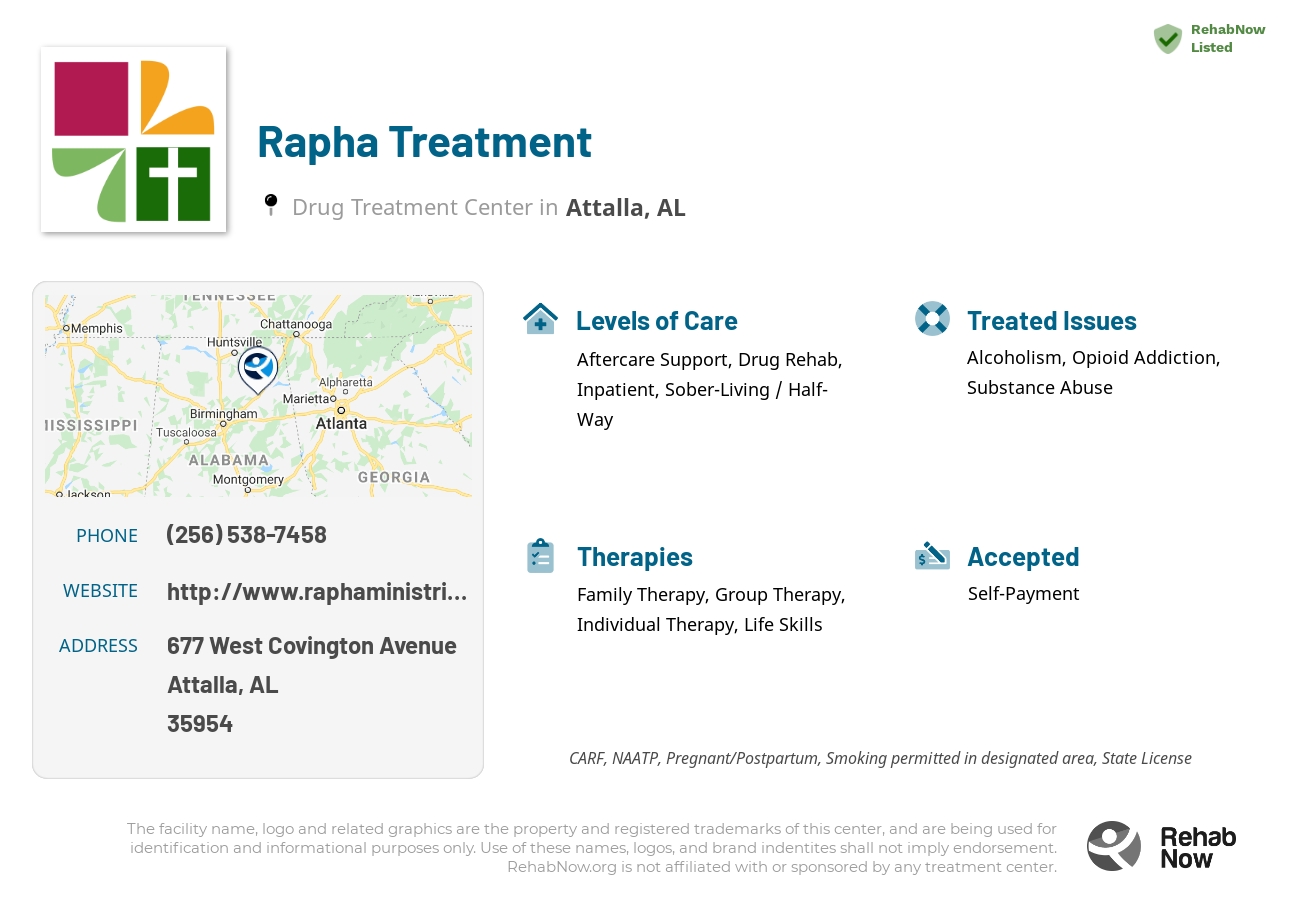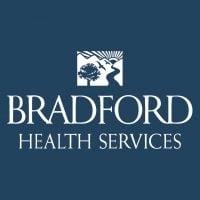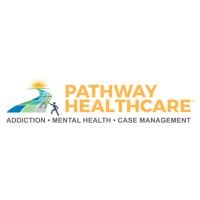
Rapha Treatment
Drug Rehab Center in Attalla, Alabama
- Substance Abuse
- Opioid Addiction
- Drug Addiction
- Alcoholism
Rapha Treatment is a faith-based, non-profit addiction and substance abuse treatment center in Alabama that offers a variety of services and evidence-based therapies to help individuals overcome their addictions and build a path towards recovery, while also providing resources such as relapse prevention, nutrition and wellness education, and life skills training to help individuals restore balance to their lives.
About Rapha Treatment in Alabama
Rapha Treatment is a 54-bed addiction and treatment facility located in Attalla, Alabama. Thier experienced and dedicated staff provides specialized care such as aftercare support, residential, inpatient and sober living/halfway house levels of care to individuals suffering from alcohol and drug addiction, opioid addiction, and mental health issues. Rapha Treatment offers evidence-based treatment programs based on the latest medical treatments and therapies and are certified by the National Association of Addiction Treatment Providers (NAATP) and the Joint Commission, thus ensuring high-quality care and the highest standards of customer satisfaction.
The comprehensive addiction treatment services provided at Rapha Treatment include individual and group therapy sessions, psychiatric consultations, medication management, cognitive behavioral therapy, holistic therapies, 12-step support, and family intervention. They also offer relapse prevention classes, stress management, anger management and nutrition support. Additionally, Rapha Treatment provides spiritual guidance and spiritual mentorship to those who seek spiritual growth. All of these services are designed to help individuals get back on their feet and live a healthier, substance-free life.
Genders
Ages
Modality
Additional
Conditions and Issues Treated
Substance abuse creates problems that affect people in Attalla, AL on many levels. First, substance abuse affects the individual who is abusing drugs or alcohol. This can result in health problems, including heart damage and overdose. Substance abuse also affects the user’s family, friends, co-workers, classmates, or peers. These people feel frustrated because they do not know how to help their loved ones struggling with addiction. At the same time, the addict cannot control his behavior. Lastly, friends and family members of addicts are affected financially by substance abuse.
The good news is that effective treatments can help prevent substance abuse or treat its effects on the user. These treatments, which include behavioral therapy and counseling sessions, target the underlying causes of substance abuse, helping users achieve sobriety so they can regain control over their lives. They also teach users to cope with stress in ways other than using drugs or alcohol.
Opioid addiction has become a significant health problem in the United States. When a person’s life becomes unmanageable because of an opioid addiction, treatment can help them get sober. Treatment includes medical care and counseling.
“With so many people struggling with opioid addiction, we need more care and attention for those who want to quit. Opioid addicts often take opioids when they experience a painful injury – that’s how the cycle starts! When someone begins taking their medication differently than prescribed or takes an excessive amount of drugs, it means they’re hooked on drugs and in danger of overdosing.
The most successful way to beat this is through detoxing from these types treatments at Rapha Treatment in . Most facilities start by using medical support during the process while providing counseling services; rehabilitation comes later on after treatment has been completed successfully.
Levels of Care Offered
This center offers a variety of custom treatment tailored to individual recovery. Currently available are Aftercare Support, Drug Rehab, Inpatient, Residential, Sober-Living / Half-Way, with additional therapies available as listed below.
Going to an inpatient rehab facility means living there while all aspects of addiction or co-occurring disorder get addressed. The treatment involves medical supervision, therapy, and future planning.
This type of rehabilitation provides a drug-free environment for people who struggle with chronic/long-term addiction without having access to drugs outside the center (or their own home). It takes away any distractions because they live there 24 hours per day. If someone is trying to break out old habits, which could lead them back into substance abuse, things like jobs or school can be put on hold until after they complete their stay to focus solely on recovery.
Sober living homes (abbreviated SLHs or sometimes sober houses ) are temporary housing for recovering addicts, most often those in early or mid stage recovery, who typically live in the home for 3 to 6 months.
The typical SLH functions as a halfway house, providing a stable living environment for addicts in recovery.
While at an SLH, residents typically meet with various therapists on site and attend regular 12-step meetings as well as other recovery group meetings.
Residential treatment programs are those that offer housing and meals in addition to substance abuse treatment. Rehab facilities that offer residential treatment allow patients to focus solely on recovery, in an environment totally separate from their lives. Some rehab centers specialize in short-term residential treatment (a few days to a week or two), while others solely provide treatment on a long-term basis (several weeks to months). Some offer both, and tailor treatment to the patient’s individual requirements.
Without aftercare support, addicts can easily relapse back into addiction. It is crucial to integrate the addict back into society. Aftercare support should take place after outpatient treatment has ended.
There are a few different types of aftercare support that patients can seek after completing an inpatient treatment program:
- 12 Step Self-help groups (AA, NA)
- Therapeutic communities,
- Long-term, structured sober living arrangements
- Halfway houses (residential treatment centers)
Many different support groups exist for addicts to seek help after treatment. Some are more effective than others, depending on the person’s addiction, background, and other factors.
Therapies & Programs
Individual therapy is a form of counseling where you meet with a trained professional one-on-one. Meeting with a therapist in this setting allows for a personal and trusting relationship to be built. This allows the patient to open up about sensitive or private issues they may not feel comfortable discussing in a group. Individual therapy helps identify the root causes of your addiction, which can help prevent relapse.
Family therapy is often done alongside drug treatment to help addicts stay sober. The goal of family therapy for drug addiction is to create an environment where communication can happen without judgment, hostility, or blame. The therapist will sit with the family so they can learn how to communicate differently and provide new tools for dealing with emotions so that people don’t want to drink or do drugs. It’s important for families to focus on relapse prevention plans during treatment so that if the addict feels like they want to use again, they’ll know what steps they need to take together to prevent it from happening again in the future.
Group therapy sessions are another common addiction recovery service. These group sessions typically involve six to 12 addicts who meet regularly with a trained professional for support and guidance.
During these sessions, the group shares their experiences with one another and provides feedback that can help each member avoid relapse or overcome specific obstacles they are facing in their recovery process. With this type of support and guidance, addicts can feel like they are part of a community that understands their struggles and will help them get through the hard times.
It’s not as simple as quitting drinking or using drugs and expecting the hard part to be over. Many addicts in recovery have discovered that they need to improve skills such as time management, organization, communication, socialization, and self-esteem. Learning certain life skills can help those who are struggling with addiction.
Payment Options Accepted
For specific insurance or payment methods please contact us.
Additional Details
Specifics, location, and helpful extra information.
Attalla, Alabama 35954 Phone Number(256) 538-7458 Meta DetailsUpdated November 25, 2023
Staff Verified
Rapha Treatment Patient Reviews
There are no reviews yet. Be the first one to write one.
Attalla, Alabama Addiction Information
Opioids, such as heroin, fentanyl, and prescription opioids are related to more than half of all drug-related overdoses in Alabama. Alcohol is the most frequently used substance in Alabama; 85,000 Alabamians use cocaine every single year. In Alabama, there are four times as many vehicle crashes involving alcohol as there are normal vehicle crashes.
Drug overdose deaths are now second only to motor vehicle accident deaths in Alabama. In Attalla, there were 14 drug overdose deaths in 2015, and 11 of those were from opioids. It is estimated that drug addiction and abuse costs the city of Attalla about $5 million each year.
Treatment in Nearby Cities
- Brewton, AL ( mi.)
- Monroeville, AL (185.6 mi.)
- Huntsville, AL (57.3 mi.)
- Scottsboro, AL (46.2 mi.)
- Woodville, AL (44.2 mi.)
Centers near Rapha Treatment



The facility name, logo and brand are the property and registered trademarks of Rapha Treatment, and are being used for identification and informational purposes only. Use of these names, logos and brands shall not imply endorsement. RehabNow.org is not affiliated with or sponsored by Rapha Treatment.





